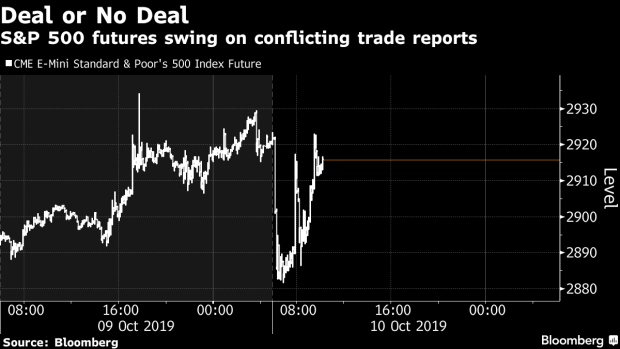Oct 10, 2019
Conflicting Trade Signals Rocked Markets With Three Hours of Chaos
, Bloomberg News

(Bloomberg) -- Even for investors hardened by more than a year of trade-war headlines, it’s been a chaotic few hours.
Conflicting signals on the prospects for a deal between the U.S. and China sent S&P 500 futures on one of their wildest rides in recent memory, triggering four 1%-plus swings in contracts that track $24 trillion of U.S. equities in a span of three hours.
The moves underscored just how jittery investors have become as negotiators meet in Washington to attempt a deal that could have major consequences for the global economy.
Read more: China-U.S. Set to Talk With Global Economy Facing Trade Crucible
After a September with only two S&P 500 moves of more than 1%, October has seen four sessions registering that magnitude in the first seven trading days. Maxwell Grinacoff, a derivatives and quantitative strategist at Macro Risk Advisors, called the index’s 1.9% month-to-date drop a “spooky ‘Vol-tober’ sell-off” in a note on Wednesday, advising investors to employ hedges to manage the swings.
“Trade talks will make for twitchy trades,“ said Vishnu Varathan, head of economics and strategy at Mizuho Bank Ltd.
Shortly after U.S. stock markets closed with a gain amid optimism about trade talks on Wednesday, futures began tanking on a South China Morning Post report that deputy-level discussions had made “no progress” and the principal Chinese negotiators might cut short their stay.
The market rallied on separate reports that top Chinese envoy Liu He would stay in Washington through Friday, before turning lower yet again. Then came another rebound on news that the White House may roll out a previously agreed currency pact with China as part of a deal that could also suspend a planned tariff increase next week.
Read more: U.S. Weighing Currency Pact With China as Part of Partial Deal
By 10:47 a.m. Hong Kong time, futures were almost back where they started, trading down less than 0.2%. The yen, yuan, oil and gold saw similar fluctuations.
Investor nervousness has increased against a backdrop of deteriorating economic data and escalating tensions between the U.S. in China in recent days.
On Monday, the Trump administration moved to blacklist Chinese tech firms including video-surveillance company Hangzhou Hikvision Digital Technology Co., alleging that they were complicit in human-rights violations in Xinjiang. U.S. officials are also reportedly moving ahead with discussions around possible restrictions on portfolio flows into China. A fight over free speech between China and the NBA, triggered by a tweet backing Hong Kong’s protesters, has added to the tense mood.
“Overall the market is pretty on the edge as we’ve seen bigger negative reactions toward trade news,” said Mingze Wu, a foreign-exchange trader at INTL FCStone Global Payments in Singapore.
Some investors have responded by adding hedges, helping push the Cboe Volatility Index, or VIX, steadily higher since late September. October futures on the index rose 1.8% on Thursday.
“The difficulty in predicting the final outcome of the trade dispute poses a challenge for investors,” Mark Haefele, global chief investment officer at UBS Wealth Management, wrote in a note on Wednesday. “Not even the negotiators themselves can yet be confident of the final result.”
--With assistance from Cormac Mullen, Jenny Leonard and Ruth Carson.
To contact the reporter on this story: Joanna Ossinger in Singapore at jossinger@bloomberg.net
To contact the editors responsible for this story: Christopher Anstey at canstey@bloomberg.net, Michael Patterson
©2019 Bloomberg L.P.